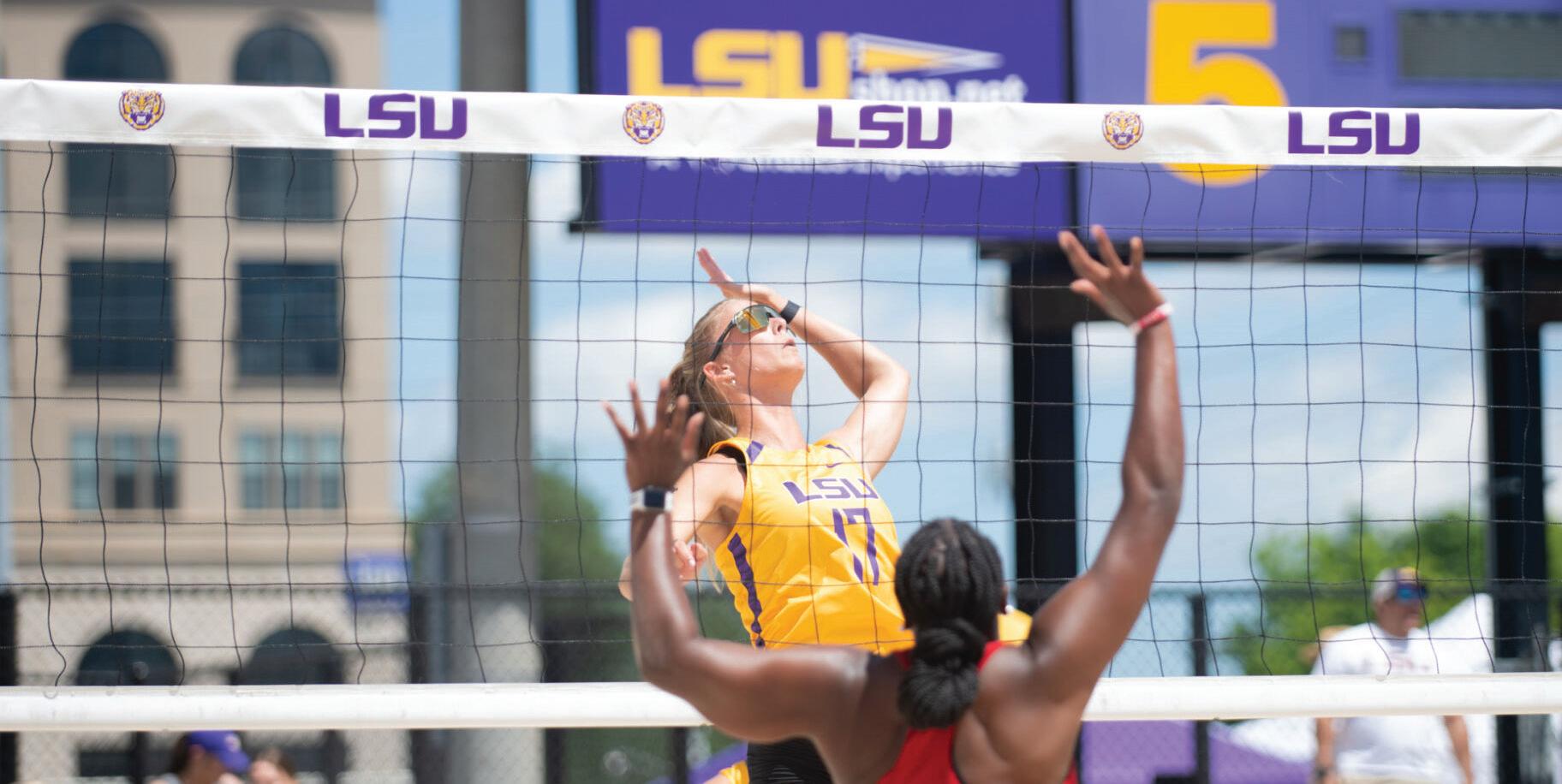






Reggie’s Bar in Tigerland has lost its liquor license after the death of LSU student Madison Brooks.
One of Reggie’s owners, Darin Adams, who was responsible for the day-to-day operations of the business, will be permanently barred from an alcohol and tobacco license in Louisiana.
Reggie’s must also pay a $15,000 fine in the next 90 days.
Sheriff’s deputies say Brooks, 19, was drinking at Reggie’s in January before leaving with three men and a 17-year-old, two of whom allegedly raped her in the backseat of a car before leaving her near a subdivision, where she was struck by a vehicle and left with fatal injuries.
Members of Brooks’ family, all wearing pink, watched in the audience as the Alcohol Tobacco Control commissioner announced the decision.
Reggie’s faced a high penalty “given the history of the location and the severity of this particular incident,” ATC Commissioner Ernest P. Legier Jr. said.
The Thursday ruling by the ATC board shutters an establishment marked by a controversial history of danger and racism. For years, Black students said the bar applied its dress code in a racist manner.
And the closing of the bar may be a step toward the resolution called for by LSU President William F. Tate IV, who pointed to bars serving underaged students in the aftermath of the rape arrests in Brooks’ case.
“All but one of the suspects involved in this horrific scenario were underage yet were able to consume alcohol at a local bar,” Tate said in a campus-wide email in January. “As such, our action plan starts with a deep and relentless focus on any establishment that profits off our students by providing alcohol to underage individuals.”
Reggie’s didn’t live up to the obligation to keep its customers safe, especially those who are underage, the ATC commissioner said.
“The issuance of an alcohol license is a privilege, not a right,” Legier said. “You accept the responsibility that the state has for ensuring public safety. Our chief and principal mission is to make sure that underage individuals don’t have access to alcohol. This business failed in this regard, and it led to tragic circumstances.”
Brooks left Reggie’s with assailants before death, police say Brooks, of Madisonville, was a political communication sophomore at LSU. She was a member of the Alpha Phi sorority, and “by all accounts, she was an amazing young woman with limitless po -
tential,” Tate said.
In the days following Brooks’ death, multiple arrests were made in connection to the alleged rape.
Kaivon Washington, 18, was charged with third-degree rape. Desmond Carter, 17, was charged with first-degree and third-degree rape and will be tried as an adult.
Everett Lee, 27, and Casen Carver, 18, are charged with principal to third-degree rape. Police allege they were in the car while the rape occurred but didn’t participate.
First-degree rape is the most
In 2016, an LSU football player was stabbed in a brawl outside Reggie’s, according to The Advocate.
Some criticized Tate’s blame of Tigerland in the aftermath of the rape arrests.
“After the horrific rape and death of LSU student Madison Brooks, community conversations almost entirely revolved around alcohol and underage drinking,” Lamandre wrote in a column in The Advocate. “LSU has seen several student deaths related to alcohol poisoning and hazing, but blaming her death on alcohol is a disingenuous deflection tactic. Had Madison been given a ride home by anyone other than rapists, she likely would have been brought somewhere safe and still be alive today.”
She said that alcohol is never the cause of rape but a way that perpetrators facilitate rape.
Tate wrote in a column of his own that several evils were at work in the Brooks case.
Many students told the Reveille they felt like this was targeting Black students. Then-president of the LSU chapter of the NAACP, Melody Robinson, pointed especially to the ban on the FUBU brand because it was owned by Black designers and was predominantly worn by Black customers.
“I honestly think this is saying, ‘We don’t want black people in our bars,’” Robinson told the Reveille. “This is just another way to say, ‘We don’t want coloreds’ without saying ‘no coloreds.’”
The NAACP chapter launched a Tigerland boycott following the article’s publication.
But years later, the problem remained.
A student, Charles Nathaniel Steptoe III, told the Reveille in 2019 that he was warned when he came to LSU that “Tigerland was racist.”
NEWSROOM (225) 578-4811
Editor-in-Chief JOSH ARCHOTE
Digital Managing Editor HANNAH MICHEL HANKS
Digital Editor JAYDEN NGUYEN News Editor CLAIRE SULLIVAN
Deputy News Editor GABBY JIMENEZ
Sports Editor PETER RAUTERKUS
Deputy Sports Editor MACKAY SUIRE
Entertainment Editor WILL NICKEL
serious offense of sexual violence under Louisiana law, punishable by life in prison without parole.
Louisiana law says that thirddegree rape can occur when the victim, through intoxication, is incapable of resisting or understanding the nature of the act.
Police say Brooks had a blood alcohol content of 0.319, nearly four times the legal driving limit in Louisiana. A person can become unconscious at a BAC of around 0.300, according to the American Addiction Centers.
A troubled history
Though Brooks’ case is the one that shuttered Reggie’s doors, stories like hers are tragically common, a sexual violence expert told the Baton Rouge Press Club in February.
Morgan Lamandre, the president and CEO of Sexual Trauma Awareness and Response, said her nonprofit sees similar situations every weekend where a woman is raped in Tigerland, the popular bar district near LSU.
Advocates from STAR frequently accompany women to local hospitals who have been victims of similar crimes as Brooks, Lamandre said. The only difference, she said, is that they’re alive to tell their stories.
“Most people are finally seeing this because she died,” Lamandre said of Brooks’ case.



Headlines of other violent incidents have frequented Tigerland over the years, including Reggie’s.
In 2014, a man was charged with attempted first-degree murder by the Baton Rouge Police Department after a 20-year-old and 23-year-old were shot behind Reggie’s.
In 2015, two intoxicated men pointed a loaded gun at patrons and employees inside Reggie’s and threatened to open fire.
“We know the first. It’s sitting in parish prison as I write this,” he said in a nod to the arrests.
But Tate said that a second evil sustained the first: alcohol.
“Our students should be able to drink responsibly, to have fun, to simply be, without being hunted by predators, and enforcing the law is paramount to their pursuit of safe, fulfilling social lives.
“But evil people exist in this
“When you’re saying no ripped jeans and no chains and no solid colors, that’s not you directly saying ‘I don’t want black people here,’” Steptoe said. “But that is you saying you don’t want black people here.”
What now?
That long, controversial history has come to an end—under the current Reggie’s ownership. But the building will soon become a part of an expanded Fred’s Bar and Grill, which operates next door, according to The Advocate.
Reggie’s had been leasing the property from Fred’s owners, The Advocate reported. The owner, Marc Fraioli, told The Advocate an expansion had already been in the works but was accelerated by Reggie’s closing.
Kerry Miller, a lawyer representing Brooks’ mother, said he’ll be monitoring the location.
Opinion Editor JOHN BUZBEE
Multimedia Editor MATTHEW PERSCHALL
Production Editor MADISON COOPER
Chief Designer EMMA DUHE
ADVERTISING
(225) 578-6090
Layout/Ad Design EMILY TRAN
Layout/Ad Design SOFIA RAMOS
Layout/Ad Design BEAU MARTINEZ
Layout/Ad Design SAMUEL NGUYEN
world, and they know that the purposefully cultivated environment at some bars allow predators to take advantage of our young people while their guards are down,” he wrote.
“That’s not blaming victims,” Tate continued. “That’s enabling criminals. And I won’t stand for it.”
“Tigerlands” exist across the country, Tate said, adding that “we must intervene.”
‘Racist’ dress codes
There have been more than two decades of student complaints that Reggie’s applied its dress code in a racist manner.
In 2003, the Reveille published an investigation into what students said were discriminatory dress codes at Tigerland.
At Reggie’s, the dress code sign read: “No Jerseys. No FUBU Shirts. No Excessively Baggy Pants. No Mr. ‘T’ Starter Kits. No All White Shoes. No Visible Beepers.”
“We’re going to do good for the people of Louisiana, the college students at LSU, other college students in the state to make sure no bad actors … ever get a license to serve liquor in this college town,” Miller said.
Reggie’s shuttering might not be the only change after Brooks’ death.
Prompted by Brooks’ death, Sen. Beth Mizell, R-Franklinton, authored Senate Bill 194, known as the Card ‘Em Act. The bill would prohibit anyone under 21 from entering Louisiana bars and increase fines for bars found serving people who are underage. The Brooks’ family supports the bill, according to Miller.
“What we know from this situation is whatever rules are in place are not followed because of the power of money,” Miller said. “And so, we’re gonna support that bill and support every attempt it is to make that culture change here and make the process safer for young people, college students in Louisiana.”
Gabby Jimenez contributed to this report.
The Reveille holds accuracy and objectivity at the highest priority and wants to reassure its readers the reporting and content of the paper meets these standards. This space is reserved to recognize and correct any mistakes that may have been printed in The Daily Reveille. If you would like something corrected or clarified, please contact the editor at (225) 578-4811 or email editor@lsu.edu.
The Reveille is written, edited and produced solely by students of Louisiana State University. The Reveille is an independent entity of the Office of Student Media within the Manship School of Mass Communication. A single issue of The Reveille is free from multiple sites on campus and about 25 sites off campus. To obtain additional copies, please visit the Office of Student Media in B-39 Hodges Hall or email studentmedia@ lsu.edu. The Reveille is published biweekly during the fall, spring and summer semesters, except during holidays and final exams. The Reveille is funded through LSU students’ payments of the Student Media fee.
“We’re going to do good for the people of Louisiana.”
KERRY MILLER Brooks’ mother’s lawyer
“The issuance of an alcohol license is a privelege, not a right.”
ERNEST P. LEGIER JR. ATC Commissioner
The number of out-of-state students enrolling at LSU has been increasing each year — a recent trend among public universities nationwide.
In September 2022, LSU announced the 7,367 enrolled freshmen surpassed the previous year’s record-breaking number of 7,038 students. Of those 7,367 students, 32.5% were from out of state, up nearly 13 percentage points since 2012.
Why are out-of-state students coming to LSU? Here’s what the data shows.

Scholarships and cost of attendance
A common perception among the LSU community is that out-ofstate students generally receive favorable scholarship awards — a claim that, once investigated, revealed mixed results.
“Wish they gave kids from Louisiana that kind of money. Then we [the state] might be able to keep some of our best and brightest home,” said a concerned parent on the LSU Parents and Students Facebook page.
Overall, about 57% of admitted in-state students received a “major merit scholarship” compared to about 44% of out-ofstate students, according to Amy Marix, the director of financial aid and scholarships. But the
STUDENT LIFE
amounts differ considerably, with the average amount awarded to in-state students being around $2,100 while out-of-state students are awarded, on average, about $16,000.
However, this is complicated by the fact that the in-state amount is designed to be in conjunction with TOPS, which gives out values from $7,462 to $8,262 per academic year. An amount
that does narrow the gap, but still leaves the out-of-state students receiving around $6,000 more than Louisianans.
Despite this difference, outof-state students still contend with an average higher cost of attendance of $52,000 while instate students get an average of $35,158.
Academics
But why does LSU pay more
Freshman experience a widerange of new experiences coming into college. Some fears they expect—others, they don’t.
After living on campus for nearly a full school year, freshmen class members provided insights on the highs and lows of what it’s like to start at this 37,000-student university and their overall review of their first year as an LSU student.
Worries before starting at LSU
One of the greatest fears from freshmen was about making friends; however, students interviewed said it wasn’t such a big deal.
for out-of-state students?
Some argue it could be to boost academics. As schools in populated areas continue to see their acceptance rates plummet, many qualified and accomplished students are forced to turn their eyes outside of state borders for the education they want.
“I’m an out-of-state student from Virginia, and I didn’t know anyone coming to LSU,” Jonathan Lynn, a political science freshman, said. “So I was really worried about making connections with not just friends, but close friends. I really think that would have been a lot more difficult had I not been involved in stuff like clubs or Tiger Band.”
Similarly, Trinity Bullock, a freshman psychology major, said, “Being an out-of-state student, especially from far up North, I
Two cousins had been looking for their grandpa’s poetry for 50 years. They found it hundreds of miles from home at the Hill Memorial Library at LSU.
The Wyatt Houston Day Collection of Poetry by African Americans is a collection of works from the 18th century, the Harlem Renaissance and the 21st century that LSU purchased in 2022.
Harry Wilson Patterson’s book of poetry “Gems of the Soul,” and poem, “Sleep On!” makes him one of 800 poets in the collection. His granddaughters, both from Washington D.C., Renee Anderson and Sharon Young, had been looking for his work for half a century.

Anderson is a retired educator and runs her own cultural arts business educating people on African culture through dance, music and performance.
Young is working on her au-
tobiography “Legends at Grandma’s House.” Her autobiography is where the journey of finding their grandfather’s work began.
The two lived with their grandfather as children, who they affectionately called “Pop Pop.” Patterson was a minister and Anderson said that she remembers him singing each Sunday.
“He always had a sense of humor,” Young said. “He made us laugh a lot.”
In October, Young called the Library of Congress to find out more information about her grandfather for her autobiography. At the time, she knew of his book, “Gems of the Soul,” but not what it contained.
From the Library of Congress, the search continued to Howard University and then to LSU.
“The miracle behind this is had we called the library three weeks before the early part of December, we would have missed my grandfather because it was just cataloged,” Young said.
The book “Gems of the Soul,” was more than what they ever imagined. Beyond poetry, it contained Patterson’s autobiography, a dedication to women of color, a short story and a sermon that he said he hoped someone would read during Black History Week, which is now Black History Month.
“Sleep On!” is a poem that honors the lives lost during Pearl Harbor during World War II.
“We really thought we were looking for just a book of poems and had no idea that such knowledge, wisdom, history and substance would be in a book so small,” Anderson said.
LSU Libraries’ Curator of Books John David Miles said the story of Young and Anderson finding their grandfather is the main goal of their collections.
“Any time we can have that organic connection between the material and the student and our patrons, that’s what we’re looking for,” he said.
Miles said the Wyatt Houston Day collection now calls LSU home because Day wanted it at a public university where the materials could be used. In the short time that the collection has been at Hill Memorial Library, LSU has hosted a number of events around it so it garners the attention of the students.
“To be able to see the book and touch the book, I’m not going to be responsible for what may happen when that happens,” Anderson said.
Young and Anderson both said young people today should be inspired by Patterson’s story because they have more opportunities than their grandfather did 85 years ago.
They would have never thought that his poetry would have traveled thousands of miles from Washington, D.C., to New York to Louisiana.
“It’s just a blessing all by itself, it was supposed to happen,” Young said.
DEMOGRAPHIC, from page 3
And the Southeastern Conference schools have been benefiting from this, as schools like the University of Alabama and University of Mississippi have become majority out-of-state and have seen their average GPA and test scores rise.
LSU could be hoping for the same effect, especially as LSU President William F. Tate IV and his administration regularly emphasize LSU’s incoming classes’ ever increasing academic ratings.
“If our current situation holds in enrollment, and I hope it does, we would have the highest average GPA admitted in LSU history … I mean, that’s getting it done,” Tate said at a February Board of Supervisors meeting.
But are these out-of-state students performing better academically? Not necessarily.
The percentage of students that made the President’s Honor Roll with a 4.0 GPA or higher last semester was close, with instate students at 5.9% and out-of-
FRESHMEN, from page 3
was worried that coming to LSU was going to be a culture shock for me. I was scared I wasn’t really going to fit in or have an opportunity to make friends and meet my people.”
Bullock said her assumption was mistaken.
“As soon as I got here, I found that that was just not the case,” she said. “There were many events put on during Welcome Week where I found the friends that I still have today. Without that week of just activities and no class, I probably wouldn’t have the friends that I do today.”
Bullock said her biggest takeaway from being a freshman at LSU is “that they foster a great environment for the transition into college from high school by providing many social opportunities to meet people and be comfortable with where you are.”
Lauryn Rosenthal, an interdisciplinary studies freshman, talked about being nervous that other students would rely on “high school cliques” and not branch out in college.
“I thought everybody was going to be a lot more closedminded than they were and that people weren’t going to be as accepting and open-minded,” Rosenthal said. “I thought everything would be just like high school again. In some ways it is, but I’m happy it’s actually not like that. I’m glad people grew at least a little bit from their time in high school.”
Freshman Jacob Fontenot pointed to another area of social stress: life in the dorm.
“I was really worried about dorm life honestly,” Fontenot said. “I thought it was going to be a lot harder to adjust to that than it was, especially when it came to the communal bathroom … It ended up being completely fine.”
state students at 5.1%.
But this gap widened when expanded to the number of students that made the Dean’s List with 3.5 GPA or above, with 23.3% of in-state students to 20.4% of out-of-state students, throwing cold water on the idea that out-of-state students perform at higher levels than their in-state counterparts.
The Honors College
While set to be more exclusive in terms of academics, LSU’s Roger Hadfield Ogden Honors College has been keeping up with the university’s increasing trend of out-of-state enrollment.
Jonathan Earle, the dean of the honors college, emphasized the need for different perspectives in the honors college, which includes those from outside Louisiana.
“My job as the dean of the honors college is to make a class that is the best honors class,” Earle said. “And for me, that means we need a lot of diversity—and that means diversity in terms of socio-economic background, it means underrepre -
Jonathan Lynn, a political science freshman, said seeking assistance through the university was difficult in the beginning.
“I think the most upsetting thing is it took me a bit of time to find out about certain resources that they had here, and then you find out about them, and it’s impossible to and really difficult to obtain the resources that are supposedly set up to help us, such as mental health and parking services,” Lynn said.
Safety is an area that surprised many students.
“When it comes to crime, they do not tell enough to students,” Eniola Oyadeyi, an industrial engineering freshman, said.
Oyadeyi advised students to never walk alone at night and always go places with friends because “I feel like you really have to protect yourself here.”
Rosenthal also said, “When I went on the tour of LSU, they promoted that it’s super safe here, and it’s just not. It’s remotely safe, and I wish they would be just a little more transparent about the area that LSU is in. They aren’t necessarily lying about it, but it’s not the full truth, so I wish they would acknowledge that more.”
Bullock talked about feeling in danger because of a broken lock on her hall door in South Hall last semester. Though they requested service, it was not fixed for a long time.
Because the door was unlocked and anyone could walk in, Bullock encountered men asking to use her bathroom late at night.
“I was terrified because why are these four random men trying to use my bathroom at the end of the hall when there’s an open public bathroom downstairs,” Bullock said.
She continued, “I felt that the school or whoever deals with
sented groups mixing with the dominant group, it means in state and out of state.”
According to Earle, there’s a major interest in the honors college from out-of-state students, and he’s already received 16,000 applications for next year’s freshman class, with “a huge majority of them from out of state.”
Of the 857 incoming students enrolled in the honors college in fall 2023, 247 students, or 29%, were from out of state, according to a chart shared by Earle. The percentage is up from 2018, when 108 out of 593 incoming students, or 18%, were out of state.
While there is no quota for how many out-of-state students the honors college accepts, Earle said the university has made efforts to find markets with lots of interest in LSU. The biggest example of this is right next door in Texas.

“A lot of people who went to LSU moved to Texas to work. So there are all these people who are the children, or grandchildren, of Louisianans or LSU al-
ums … The other thing is Texas, because of just the demographics of [the] state, it’s so hard to get into Texas A&M and UT Austin right now,” Earle said.
The honors college’s recruitment efforts, like the university’s, include sending out mailers, making calls and having a recruiter meet in person with prospective students. By bringing out-of-state students in, Earle said he hopes they will bring innovative ideas to the classroom.
“That is certainly part of the strategy, is to keep people here and solving Louisiana’s problems. We’ve got problems, challenges … We’ve got endemic poverty, we’ve got coastal land loss, we’ve got a public school system that is ailing,” Earle said. “I’d love it if we use the best and brightest from states, all over 50 states, to solve our problems.”
Looking forward
Other public schools around the country have significantly higher percentages of out-ofstate students. Earle pointed back to the University of Alabama as an example, where
nearly two-thirds of the latest freshman class is from outside the state.
“Can you imagine if we had 65% on this campus out of state? I don’t think that would fly. Because we’re here for the people of Louisiana, we serve Louisiana,” Earle said.
While the ratio of students coming from outside Louisiana likely won’t change soon, the numbers might stop increasing. According to Earle, universities around the United States are about to be hit with an enrollment cliff caused by a decline in births between 2007 to 2009 due to the recession, resulting in fewer college applications. Because of the enrollment cliff, Earle said universities will be scrambling to bring in those 18-year-olds.
In the future, Earle said he wants the honors college to spend more time recruiting in places like Chicago, Los Angeles and New York City, but ultimately, the out-of-state student trend at the university will depend on the direction of LSU’s leadership.
safety really didn’t have that as a concern and that’s concerning to me. I hope other incoming freshmen do not have to deal with an occurrence like that or even similar to that.”
Freshman Abby Martin advised, “Carry pepper spray because it is not safe. The emails they send out about crime on campus are very frequent. It really scared me my first semester, especially as a woman, so just be aware of that while you’re here.” What it takes to be a successful freshman at LSU To do well in classes, Oyadeyi said, “You have to learn a lot of material yourself. A lot of the information you have to learn by
yourself, so set up a daily schedule. Don’t neglect your schoolwork because I know it can be easy to get distracted, but you just have to find a balance between everything.
Rosenthal provided tips to succeed as a student.
“Go to class, and don’t skip,” she said. “Even if you think you know it all and can do it all by yourself, go to class. Your professors are there to help you. Their whole job is to help you, and make sure to use all available resources because LSU has so many.” Bullock advised freshmen to go to as many events as possible when starting college.
“Find the people that you want to spend all those hours outside of class with,” Bullock said. “Find your future roommates or even the people that you want at your wedding one day. Overall, just find your people before you settle in because without a support system, it’s going to be hard to handle what you’re supposed to do for the next four years.”
Bullock said she would tell incoming freshmen that “it’s okay to not know where you are going or what you’re going to do in the future. There are people here on campus to help you with knowing. Advisers, friends, professors, there’s always someone you can ask for help from.”
This past Thursday night, LSU Student Government hosted its annual installment of Groovin’, a spring concert organized by students and for students.
This year’s performers were Mariah the Scientist, NLE Choppa and Nardo Wick.
Mariah the Scientist kicked the showoff with “Revenge” a more emotionally charged ballad from her latest album “Ry Ry World.” She proceeded to perform fan favorites such as “Beetlejuice,” “Reminders” and
“2 You.”
Her set featured stunning visuals, interactions with the crowd and the occasional lighthearted joke.

About halfway through her set, Mariah changed gears and stated she did not want to “keep playing sad sh*t.” From there, she performed some of her more upbeat songs, such as “Walked In” featuring Young Thug and “Stone Cold,” her collaboration with Dess Dior.
She concluded the show with a performance of her viral single “Spread Thin” and spoke of how happy the turnout made her.
The Atlanta singer set the tone for the remainder of the night and has a solid fan base here at LSU.
Next up was NLE Choppa, a Memphis rapper who has gained prominence for his outlandish but catchy lyricism.
NLE Choppa did not hold back on stage and encouraged the crowd to be as hype as he was. His set included spark ejectors, dancing around the stage and entertaining commentary from his DJ.

NLE Choppa performed some songs from his latest album “Cottonwood 2,” along with popular tracks such as “Slut Me Out” and “Walk Em Down.”
He wrapped up his set by bringing national champions Angel Reese and Flau’jae Johnson on stage, and Flau’jae surprised the crowd with her own performance.
Jacksonville rapper Nardo Wick was booked to close out this year’s Groovin’ concert but was unable to attend due to missing his flight. Students expressed their disappointment on social media, as no prior notice was given about him not being there.

The event generally had a solid turnout with a seemingly full venue. The excitement radiating through the PMAC as performers took the stage was undeniable.
While most LSU students attended Student Government’s annual Groovin’ concert Thursday night, other students decided to attend a different kind of concert: a Christian concert.

The Carry the Love Festival stopped at the LSU Greek Theater on Thursday for a free night of music and evangelism.

From the first words spoken into the mic, Carry the Love made its intentions clear.
“We’re about to go crazy for Jesus,” yelled prayer leader Brad LaChapell.
For the following two and a half hours, the roughly 130 concert attendees went crazy for Jesus. Some raised their hands in prayer, and some lowered their heads. Others used the amphitheater’s concrete seating like a pew and knelt in prayer.
The event was organized by Circuit Riders, a non-profit, nondenominational organization dedicated to training the next generation of evangelical Christians. Although based in Huntington Beach, California, the organization is using its Carry the Love campaign to spread its reach throughout the world.
According to event organizers, the next stop on the campaign trail is South Africa, where the group will host concerts and do mission work.
In general, the campaign aims to spread the Christian faith on high school and college campuses. According to Circuit Riders, this goal has never been more important.
“There’s brokenness in the world. It’s around 50% of college students that deal with depression, and 10% consider suicide,” said Ben King, an event organizer, and Circuit Rider preacher. “We just believe that Jesus is the answer for a generation. We’ve seen time and time again the presence of God showing up through the music and through the message bringing freedom and healing.”
King is 25 years old and has been with the organization for seven years. Fresh out of high school, an 18-year-old King moved to California from Pennsylvania to join Circuit Riders’ leadership program.
Throughout the event, he was one of the few non-singers to hold the microphone, and his segment was devoted to what he described as the healing power of prayer. He began by asking
if anyone in the crowd suffered from depression or anxiety, then prayed for them. He repeated that process for a range of ailments that only grew more and more.
“We pray right now that Lyme disease will be healed,” said King in his final address.
The healing prayers certainly benefited some attendees. Before the final song, King asked anyone who felt a distinct change in their body or mind to come forward.
Kiah Jackson, 18, joined him on stage and was given the microphone. She told the audience about her chronic problem with headaches. A particularly nasty one had been affecting her all day but disappeared after King’s prayer segment.
“I felt the pressure release and heat like fire all down my spine,” she said.
The audience erupted into cheering and applause, and King thanked her for her testimony.
Jackson is not affiliated with Circuit Riders, but young people like her are one of the organization’s biggest resources.
Grant Walker, 21, is a youth leader in one of the organization’s leadership programs. He also drives one of the campaign vans. Walker joined Circuit Rid-
ers immediately out of high school and has been with them for three years.
Caleb Farrales, 19, attended his third Carry the Love concert Thursday. He was also at the Los Angeles, California and Tulsa, Oklahoma shows. To attend, he takes a flight from his home state of Colorado to wherever the venue happens to be.
Elias Jones, 18, also joined the organization after high school. Hailing from Nova Scotia, Canada, he enrolled in the leadership program to find other people invested in Christian faith. According to him, the Circuit Rid-
ers community has been all he wanted and more.
“They’re all about it. I’ve never met people who loved Jesus like this,” he said.
LSU child and family care major Emily Reynolds also felt a sense of community in the event. Reynolds spent much of the concert in front of the stage, conversing with those around her. She said there were many people who drove in from other cities like New Orleans or Lafayette, something she appreciated.
“It’s so nice to see people from so many places come together to worship God,” she said.



 BY CHLOE RICHMOND @chlorichmond
BY CHLOE RICHMOND @chlorichmond
After a career full of leaning on her faith and following her intuition, Josie Vondran’s heart led to using her fifth year of eligibility at LSU.
As her last season approaches its end, she’ll leave LSU with more than the experience of playing volleyball.
From the beginning of her collegiate career, Vondran had trouble deciding which school she wanted to call home for four years. After much thought, Vondran committed to the University of Dayton on April 30 of her senior year, the last day to make a decision. She saw limited time on the court during her freshman campaign in 2018, but in 2019, Vondran took off and led the Flyers with 308 assists, averaging about 4.7 per set.
Vondran was content with her career panning out at Dayton, but
she always pondered the idea of going back home to become a Buckeye. Considering how both of her parents were studentathletes at Ohio State, she was surrounded by the Buckeye nation her whole life and grew up with Ohio State being her dream school.
When her recruitment process started in high school, Vondran felt that the direction Ohio State’s volleyball program was headed wasn’t the right fit for her at the time. It wasn’t until a new head coach was announced that Vondran realized she wanted to become a Buckeye.
In January 2020, Ohio State volleyball alumna Jen Flynn Oldenburg was hired to become the head coach for the Buckeyes. Oldenburg played from 1996 to 1999 and developed a close relationship with Vondran’s mom, Tracy, who played from 1989 to 1992.
The two kept in touch over the years and Vondran knew she
couldn’t pass up on the opportunity to learn from one of the greatest Buckeyes in program
history.
Vondran’s first season with the Buckeyes is one most volleyball fans remember across the country. In her first season, coach Oldenburg was given a program that went 15-17 in 2019 and completely flipped the script, leading the Buckeyes to a 16-4 record. Vondran described the experience as one that majorly impacted her career and development as a player.
After two seasons with the Buckeyes, Vondran was given the choice to use a COVID-19-granted fifth year of eligibility after her senior year.
“I was actually planning on taking my fifth year at Ohio State, but in the beginning of January of 2022, I was told to go find somewhere else to play,” Vondran said. “So it wasn’t really by choice. I was happy and I loved being a Buckeye ‘cause that was what my parents did, but it just wasn’t
working out.”
With an open mind heading into the transfer portal, Vondran’s biggest focus was making sure the school she ended her collegiate career with would make her happy. She received a handful of phone calls and emails for recruitment and the three schools she talked to and engaged with the most were Brigham Young University, the University of North Carolina at Chapel Hill and LSU.
“After I went into the portal, [associate head] coach Jill Wilson, from the indoor team, she called me,” Vondran said. “She was my coach at Ohio State, formerly, and she was basically just like, ‘When you’re ready to start talking about recruiting, take a look at LSU because we would like to have you for next year.’”
During her recruitment prosee VOLLEYBALL, page 10
BASEBALL
Heading into the bottom of the fifth, LSU trailed Alabama 7-3. It wasn’t quite the five-run deficit it had bounced back from yesterday, but in this case, the Tigers had two less innings to mount a comeback.
The deficit was a result of a rough performance from reliever Nate Ackenhausen, along with a throwing error from Jordan Thompson that further added to the Tide’s ever-increasing momentum in the fifth.
Starting pitcher Christian Little’s struggles didn’t help matters either, as he was subbed out earlier than the coaching staff prob -
ably wanted him to be, but he at least managed to get the Tigers out of some rough spots to temporarily hold Alabama at bay.
Through the first three innings, he allowed just one run, which came when Tre Morgan failed to secure a routine fly-out. That came despite facing loaded bases in both the first and third innings, as Little and the LSU outfield managed to clutch up in both scenarios.

He’d produced less balls than strikes and issued as many walks as he had strikeouts, but he managed to keep Alabama at bay through the first three innings and struck out its final batter of the third with the bases loaded. When asked about Little’s strug-
gles, LSU head coach Jay Johnson said that they mostly had to do with the team they were facing.
“I mean, he threw more strikes last week than he did this week,” Johnson said. “Again, Omaha-caliber team, like that’s just the bottom line. Just to sweep an RPI Top 20 team that already has 30 wins at this point is a great accomplishment.”
He’d ultimately falter in the fourth, hitting Colby Shelton to start before surrendering a double that would allow him to reach home. With 86 pitches, the LSU coaching staff sent Ackenhausen into the game, which is where things took a nosedive.
Less than two innings later, the Tigers had gone from leading
by two at the start of fourth to trailing by four entering the bottom of the fifth. Against 10 batters, Ackenhausen allowed four hits and four runs (two earned), and he stumbled to get the Tigers out of the rough situation left behind by Little in the 4th.
Considering what had happened just one night prior, there likely wasn’t a single soul in the Box that doubted LSU could come back. Rooting for a team that makes multi-run comebacks appear routine does that to people, and though pulling off two within a 24-hour span is absurd, it certainly isn’t impossible for LSU.
“No. We’re never out of a
VOLLEYBALL, from page 9
cess with LSU, the coaching staff was a main factor in her decision to become a Tiger. Vondran felt like she had an “awesome level” of connection with the coaches on her visit. Like Ohio State, a new head coach was headed to campus for the Tigers when Vondran was looking for a new school—Tonya Johnson was named the head coach for the indoor team, returning to her alma mater after playing for LSU from 1987 to 1990.
Just as she was with Ohio State, Vondran was a part of another successful first season under a new head coach. The 2022 indoor volleyball season was one of the most successful for LSU in years, and she contributed greatly to that.
Sharing time at the setting position with freshman Maddie Waak, Vondran averaged near 6.5 assists per set with a total of 732 on the season to lead the Tigers. Aside from notable wins over top25 opponents, the indoor team also advanced in the NCAA Tournament for the first time since 2014, making this past season one to remember.
“I think that when you have a huge breakout season, I think a lot of teams initially think that it’s a fluke,” Vondran said. “I can say that I think both Ohio State and LSU have pulled through. Last season for LSU, I think we pulled through significantly by making it to the tournament. I know a handful of people didn’t think we’d make it.”
After the incredible run from LSU’s indoor volleyball team this past season, Vondran headed out to the sand for LSU beach volleyball’s 2023 season.
“Even in the beginning parts of my collegiate career, [I knew] I did want to end playing beach in
game,” Johnson said when asked if there was a deficit this team couldn’t come back from. “With our team and our offense, the other team is going to have to use their bullpen in any game they’re ahead or we’re going to come
college,” Vondran said. “That was one of the selling points coming here, that I could play indoor and beach.”
Since Vondran has been around volleyball her entire life, she feels as though her indoor volleyball IQ is strong and she knows the game very well—she says she wants to get to the point where she knows the game of beach just as well.
“Oh my goodness, I have so much respect for girls that play beach volleyball,” Vondran said.
“There is just so much strategy that I didn’t know about. I have to be in really, really good shape.
back.”
On Saturday, it took the Tigers four innings to steal the lead from the Tide. Today, it took one.
Before they even achieved a hit or received an out in the fifth, the bases were already loaded. A throwing error from Colby Shelton along with two issued walks

I have to move in the sand really well. I have to have really, really good ball control. Those things are important in indoor, but I’d say that they’re exposed more often when you’re on the beach. I’m basically uncomfortable for two hours a day trying to learn a new game. It’s a challenge, but it’s really fun.”
As beach volleyball approaches postseason, the plan for what’s next is something Vondran has always had her mind set on. She plans to pursue a professional career in indoor volleyball.
“That has been a huge goal of mine since even before I played
set Dylan Crews up with an immediate opportunity to get them back into the game.
He’d single to left field, allowing Alex Milazzo to get home.
Following Crews at-bat, it took Alabama four more batters to even pick up an out, as the Tigers put up runs left and right on an
in college,” Vondran said. “And now with all the pro leagues in the U.S. coming out, and even a couple [of] leagues overseas, there are some really good opportunities for me to continue playing, and my body is healthy enough that I still love the game well enough. I don’t want to be done yet.”
Once the beach volleyball season comes to an end at the beginning of May, so will Vondran’s collegiate career. Although she was only on campus for one year, Vondran’s time as a Tiger contributed to a historic turning point for the LSU indoor volley-

array of hits and walks. At that point, White reached home off a fly out from Jared Jones to regain the lead for LSU.
LSU scored one more run in fifth and five more runs total, pulling off the sweep with a 13-11 win in game three. With the Tigers allowing 11 runs, 10 hits and seven

ball team, and she thanks LSU for giving her something greater in return.
“If you would’ve told me, like, four or five years ago today that I would’ve ended up playing in Louisiana, you know, playing here, compared to just four straight years at Dayton, I would’ve not believed you,” Vondran said. “I just cannot be any more grateful for what the coaching staffs at LSU have done for me because my love of the game has definitely been brought back. It’s crazy what a year’s difference makes. I’m more than grateful for the experience.”
walks while also hitting three batters and attributing four errors, this was by no means a perfect game defensively, but the offense once again worked wonders.
LSU’s next action takes place in Hammond, as the tigers travel to face Southeastern Louisiana at 6:30 p.m.
8-6 win over Alabama at Alex Box Stadium.
Note: The following column is written entirely by the March 23 version of ChatGPT. It was given the following prompt: Write a 500-word satire newspaper column in AP style about how A.I. poses absolutely no threat to the field and future of journalism. It created this content in about a minute; this was the third attempt and prompt given to ChatGPT. No manual edits were applied to the response.
In recent years, the rise of Artificial Intelligence (A.I.) has caused a great deal of anxiety in the journalism industry. Many have worried that robots will soon take over our jobs and that journalism, as we know it, will become a thing of the past. But fear not, dear readers, for I am here to assure you that A.I. poses absolutely no threat to the field and future of journalism.
First of all, let’s consider the capabilities of A.I. technology. While it’s true that machines can now write basic news stories, they
are still incapable of producing the kind of high-quality, nuanced reporting that we have come to expect from human journalists. A.I. algorithms can certainly analyze data and spot patterns, but they lack the ability to interpret and contextualize that information in the way that human beings can. They can crunch numbers, but they can’t interview sources or attend press conferences. They can spit out headlines, but they can’t write compelling ledes or craft a narrative that captures the attention of readers.
Furthermore, A.I. technology is not yet sophisticated enough to handle the complexity of journalism. Journalism is not just about reporting the facts; it’s about investigating, analyzing, and interpreting those facts in a way that provides insight and context. It’s about telling stories that matter to people and holding those in power accountable. These are skills that cannot be replicated by machines.
But even if A.I. technology were to advance to the point where it could replace human journalists, there is still one crucial element that machines cannot replicate: empathy. Journal-
ism is ultimately about telling stories that connect with people on a human level. It’s about capturing the emotions, experiences, and perspectives of real people and presenting them in a way that resonates with readers. A.I. algorithms may be able to analyze data and produce articles, but they cannot empathize with the people whose stories they are telling. They cannot understand the human condition in the same way that human journalists can.
In fact, the rise of A.I. technology may actually benefit the journalism industry in some ways. Machines can handle the more mundane aspects of journalism, such as fact-checking and data analysis, which can free up human journalists to focus on more important tasks, such as investigative reporting and long-form storytelling. A.I. technology can also help to automate certain aspects of the newsroom, such as social media posting and content distribution, which can save time and resources for news organizations.
In conclusion, the idea that A.I. poses a threat to the field and future of journalism is nothing more than a baseless fear. While
machines may be able to perform certain aspects of journalism, they lack the creativity, empathy, and complexity of human journalists. As long as journalism remains a field that values these qualities, we can rest assured that A.I. will never be able to replace

us. So let us embrace the advances of technology and continue to tell the stories that matter, with all the heart and soul that only human journalists can bring.
ChatGPT is a 5-month-old A.I. chatbot developed by OpenAI.

In early April, 250 bright orange scooters-for-rent mysteriously appeared, littering the university campus and its vicinity.
San-Francisco-based electric scooter company Spin has partnered with LSU’s Parking and Transportation Service, Student Government and the Office of Research and Development to provide short to medium distance transportation while contributing to a “micromobility” research project, according to an LSU media center release.
Users can pay $1 to unlock a Spin scooter and $0.30 per minute of riding; scooters have a max speed of 15 miles per hour but have pre-programed “slow ride zones” and “no ride zones.”
Here’s some thoughts from The Reveille’s opinion section:
BY LAUREN MADDEN @lllomaddWe all saw the athletes on their scooters and wished we had them,
too. Now we do but it comes at a cost – literally.
They’re great in theory, but so far I don’t understand why we have them. They are parked all over campus, in the most random places. They’re bright orange so they look like moving traffic cones. How do they recharge?
Who is liable if someone gets injured by them? So many unanswered questions.
They just appeared all over campus overnight. The athletes get their scooters for free, right? Why do the “common-folk” students have to pay to use them?
BY BENJAMIN HAINES @bphainesThe older I get, the more I think “Wall-E” had the future right. The future isn’t in humanity; it’s in manufactured laziness.
Piled everywhere across campus, along streets and sidewalks, are those damn orange scooters. They litter the streets, transforming transportation into pedestrian hazards.
If you’re late for class, try running – using your feet is surely better for your heart than idly standing on those zippy bi-wheeled eyesores every LSU athlete seems to own.
If I was dictator of LSU for the day, my first executive order would be to prohibit those pussyfooting modes of transportation, and make it legal for everyone to clothesline their riders from their footed mounts.
BY ISABELLA ALBERTINI @BasedIsabella“Can you hear that? Is it a lawnmower? A chainsaw?” No! It’s a bright orange scooter zooming right towards you! Watch out!
Many question whether these scooters should have a safety hazard, not so much for those using them but for those around them. Although you can distinctly hear it coming up behind you, several students wear noise-canceling headphones as they walk across campus and cannot hear it coming.
They are available to everyone, but using these scooters isn’t free.
In addition, there is no specific place students have to return the scooters to once they’re done using them, and it’s common to see the bright-orange eye sores scattered around campus.
BY MATTHEW PELLITTIERI @m_pellittieriWhen looking at a phenomenon like the plague of orange scooters, it is essential to ask one question: why?
Why are people using them? The obvious answer is as a quick and easy means of transportation, but there has to be a better system that doesn’t irritate (and threaten) literally every person not on them.
Personally, I would suggest just walking faster. Of course, the real reason that a lot of people use the scooters is because they think they look cool (they’re wrong). It is a horrifying experience to be on your way back to your dorm from a late night studying session in the library only to be confront-
ed with a horde of frat boys zooming back and forth on the empty streets.
BY FRANK KIDD @FK446852315Some people have an issue with athletes getting scooters for free, but I think it makes sense. We should be offering as many incentives as possible for good athletes to come here.
The recent Women’s basketball victory and the 2019 Football championship season were great. Arch Manning went to school in New Orleans and still chose to go to Texas. We should give the athletic department whatever they need to win. Automatic A+ grades, as much money as it’s possible to give to athletes, even Prima Nocta.
If research departments complain about funding, tell them to hang some banners first.
Editor’s note: Frank Kidd misinterpreted the prompt to be about athlete scooters.
“It
Deputy News Editor Gabby Jimenez Claire Sullivan News Editor John Buzbee Opinion EditorThe Reveille (USPS 145-800) is written, edited and produced solely by students of Louisiana State University. The Reveille is an independent entity of the Office of Student Media within the Manship School of Mass Communication. Signed opinions are those of the author and do not necessarily represent the views of the editor, The Reveille or the university. Letters submitted for publication should be sent via e-mail to editor@lsu.edu or delivered to B-39 Hodges Hall. They must be 400 words or less. Letters must provide a contact phone number for verification purposes, which will not be printed. The Reveille reserves the right to edit letters and guest columns for space consideration while preserving the original intent. The Reveille also reserves the right to reject any letter without notification of the author. Writers must include their full names and phone numbers. The Reveille’s editor in chief, hired every semester by the LSU Student Media Board, has final authority on all editorial decisions.
Michelle Obamais absolutely still possible to make a difference.”
